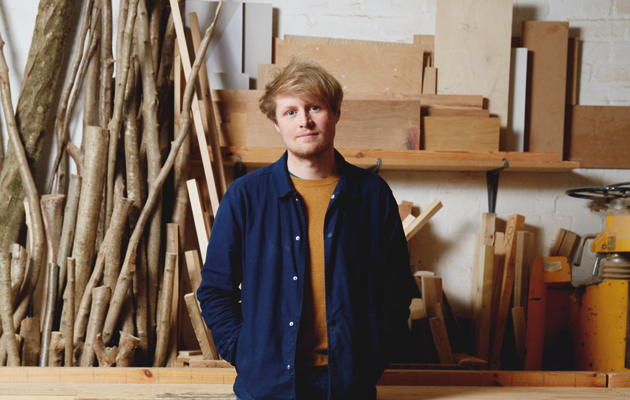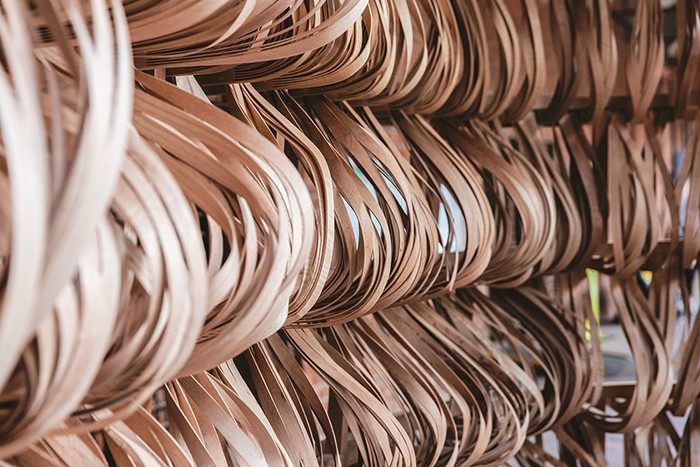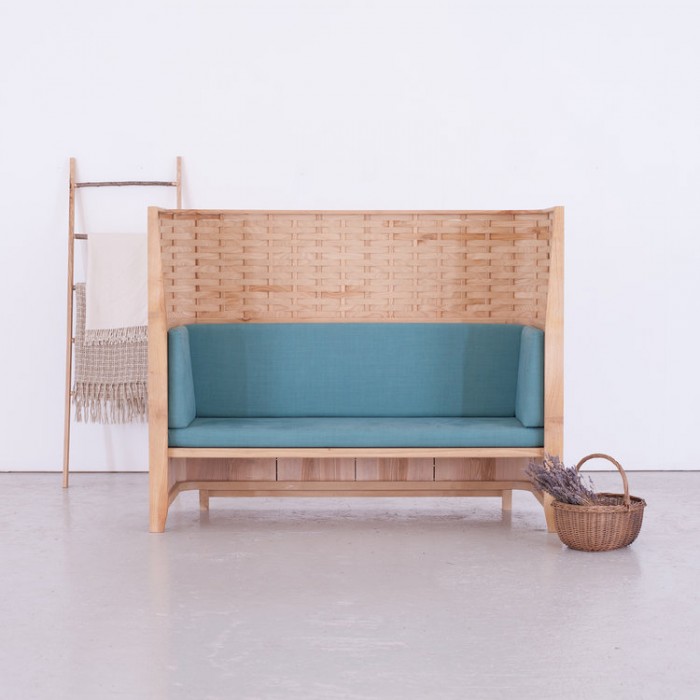A conversation with: Jim Biddulph & Sebastian Cox
There aren’t many design brands that can boast to having the facilities to not only design and make their products, but to process their own raw materials, in addition to having a space in which to showcase them. There are even fewer to have done so having only set-up their company in the last decade. It takes a unique approach and clear sense of purpose to do so, something that designer, maker and all round wood enthusiast Sebastian Cox has utilised in establishing his one-of-a-kind studio.
Having graduated from the Furniture Design and Craftsmanship course at Lincoln University, Cox followed it up with an MA in Design at the same university. This very quickly became an intense study into sustainable design and kick started the business as soon as he graduated in 2010.

Remaining in the beautiful Lincolnshire Wolds, working from a large stable with plenty of space to operate in, he began working frantically on new work whilst continuing to delve deeper in the world of design with regular visits to design shows and events in London. He made a major breakthrough with his still popular Oak & Hazel collection for Heal’s and has continued to champion wood in all of his work. The multi award-winning kitchen he designed with deVol has even received a Design Guild Mark, whilst he himself recently became a Liveryman of the Carpenters Company in the City of London. Now a team of 10, based by the river Thames in South East London, I caught up with Sebastian to find out more his roots in wood and how the studio operates.
JB: It’s safe to say that you have a pretty unique set-up. Can you explain to me how all the parts of your studio fit together?
SC:We have series of spaces which all come together to create our little home! We have a design studio and showroom where Brogan, my co-Director and wife, rules the roost, a bench shop where all our makers have their own space to assemble and finish whatever pieces they’re working on and the mill, a large long space where all of our machines are lined up opposite our timber store. It’s one of the most exciting spaces in our business because it signifies efficiency and speed. It is this space that allows us to produce large orders, for big clients just as easily as we can produce individual bespoke pieces.

JB: Where does the affinity to wood come from, has it always been your material of choice?
SC: I grew up surrounded by the countryside and have always been a very practical person. My father restores timber-framed buildings for a living so I have always found the smell and feel of wood incredibly comforting. It made sense for me to make a living doing something physical with wood. What’s more wood is the perfect sustainable material. If you were to design the perfect material for the future it would be strong, lightweight, offer differing texture and appearance each time you used it, it would be sustainable, ideally biodegradable and better still it would absorb carbon dioxide out of the atmosphere as it grows. And that is wood.
JB: It seems quite unusual to have your own mill when there is such a healthy abundance of sustainable timber out there?
SC: Our mobile sawmill affords us access to individual trees, sometimes in hard to reach spaces, which tree surgeons or timber yards may not have the time of the resource to work with. It is a piece of kit which allows us to manage the production of a piece of furniture from the very beginning, to the very end; taking care of each stage of the process. This means we can be assured it is as efficient and ethical as possible and then totally satisfied in the finished piece.

JB: You’re seen to be a ‘Champion of British Woodlands,’ can you explain a little more about what this really means?
SC: We’re motivated by good design and by sustainability. Britain has a beautiful selection of hardwoods that are perfect for making furniture but often overlooked and we want to shine a spotlight on these species. We just don’t need to import as much wood as we do. More importantly though we also believe that by using this wood to make fine furniture we offer landowners an economic reason to manage their woodland. And managed woodland has increased biodiversity and this is something we care deeply about. We are in a state of mass extinction and focusing on biodiversity is the most effective way of changing this. We have a couple of projects in the pipeline anchored on this message, which we’re hoping to launch next year.
JB: The studio is quite prolific in terms of the volume and range of products that you produce, with new ranges coming out at fairly regular intervals. Are there any you’ve enjoyed creating in particular?
SC: We presented a pair of new pieces for the first time during the London Design Festival; an oval shaped, scorched pedestal table and undulating, rippled sycamore cabinet with slung leather shelves. They’re quite a dramatic pair with a very solid shape to them. At the other end of the spectrum we also launched a new collection called Pendean. This is a batch-produced series of furniture, with simple chamfer details, made entirely in characterful English ash.

JB: Like the wood that you use in making your wares, do most of the end products remain here in the UK?
SC: A lot do, but we have an international audience. A highlight of the last year has been a series of large space defining wooden screens we have designed and made for Burberry stores, from Dubai to America. What an honour it is to send work made in London, from characterful English wood, to international fashion stores!
For more information about Sebastian Cox, visit their website




